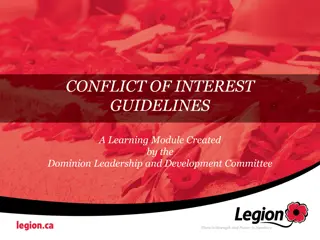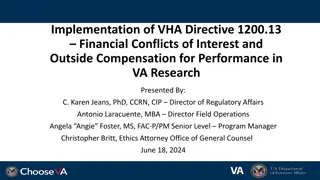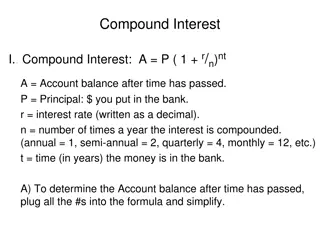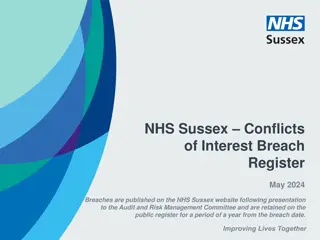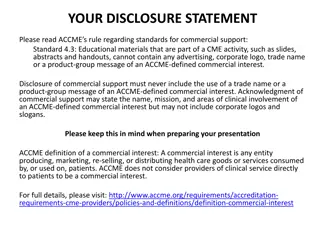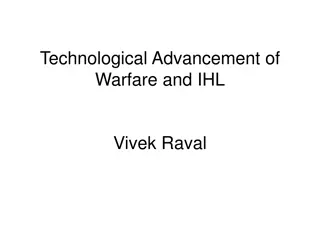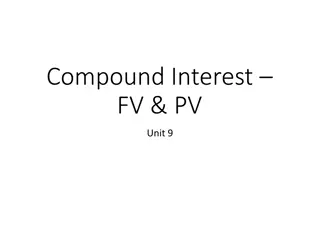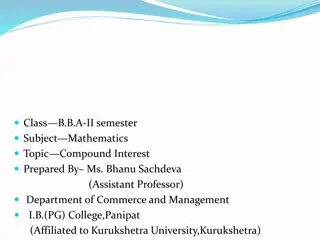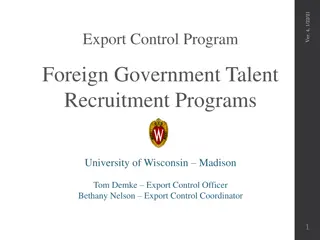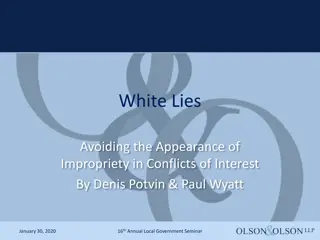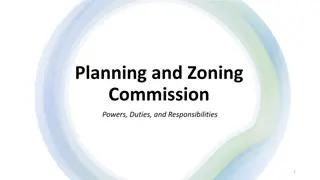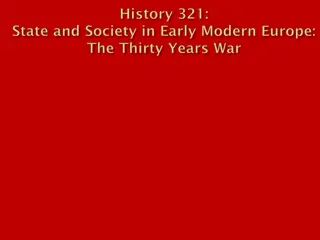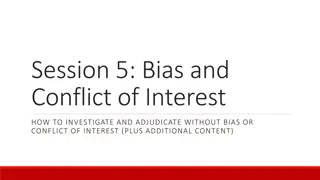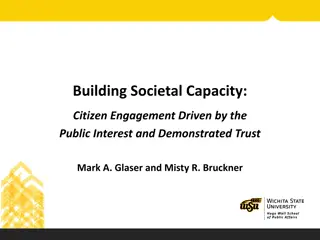Understanding Financial Conflicts of Interest in Research
In this content, the focus is on the significance of Financial Conflicts of Interest (FCOIs) in research, specifically in academic medical institutions like Jefferson. The IRB's role in reviewing and managing FCOIs to protect research participants and ensure informed consent is highlighted. Areas of concern regarding IRB members' knowledge of managing conflicts of interest are addressed, emphasizing the importance of effective management plans. The role of the Conflict of Interest Committee in reviewing and addressing FCOIs is also explained.
Download Presentation

Please find below an Image/Link to download the presentation.
The content on the website is provided AS IS for your information and personal use only. It may not be sold, licensed, or shared on other websites without obtaining consent from the author. Download presentation by click this link. If you encounter any issues during the download, it is possible that the publisher has removed the file from their server.
E N D
Presentation Transcript
AAHRPP Findings & IRB Education KYLE CONNER, MA, CIP SEPTEMBER 2021
The AAHRPP site visit AAHRPP conducted 3-day re-accreditation site visit in June 2021. Visit was collegial and site auditors were impressed with several unique aspects of Jefferson s human research protection program (HRPP), including the Kimmel Research Liaision Office (RLO) and JCRI s research education program. The site visit report contained 3 findings that required response and plan to address. This presentation will provide IRB member education that was indicated in response for 2 findings
Area of Concern 1 IRB members reported that researcher conflicts and management plans were generally not discussed at meetings. Instead, IRB members stated that management of conflicts of interest was the exclusive responsibility of the Conflict of Interest Committee and were not knowledgeable about the IRB s role in approving management plans.
Background - Significance of FCOIs Financial conflicts of interests (FCOI) for researchers are becoming more prevalent as academic medical institutions like Jefferson pursue innovation and business partnerships to development new drugs, devices and technologies. FCOIs are an accepted aspect of clinical research and do not imply wrongdoing. However, in many cases, they do need to be reviewed and managed. FCOIs may need to be managed because they represent an implicit and possibly unconscious bias that may affect the researcher s involvement and judgment in a research study.
Background - Significance of FCOIs The IRB s stake in review of FCOI management plans is to ensure that the plan is adequate to protect research participants from potential harm resulting from the FCOI and to ensure that the consent form contains all relevant information pertaining to the FCOI so that individual can make informed decision about participating. IRB authority in this regard follows from the Common Rule mandate that one of the roles of the IRB is to limit risk to research participants.
Role of COI Committee The role of the COI Committee is to review all potential FCOIs to determine if they meet university criteria that necessitates generation of a management plan to eliminate, mitigate, or manage the FCOI for the individual. All individuals involved in conduct of research are required to file a disclosure in the COI-Smart system, and to update the disclosure as necessary when changes in the individual s FCOI occur. The routes by which the COI Committee learns about potential FCOIs are: notification by the individual via COI-Smart; notification by OHR; notification by other Jefferson sources.
Role of COI Committee Following generation of a management plan, the COI office will notify the individual and ask they either accept the plan as is, offer suggestions for modification, or rebut the plan. This process continues until both the individual and pertinent chair/supervisor agree to the plan by proving signature. COI office will then provide copy of the management plan to OHR, and the plan will be presented to the IRB in relation to the pertinent research study. Associate Director, OHR, and Dr. Chambers, Chair of IRB#2405 site on COI Committee.
Role of IRB Upon being notified of an FCOI management plan that is related to a research study, the plan must be reviewed by either the full committee, for studies receiving full review, or by subcommittee, for studies receiving expedited or exempt review, to determine whether the plan can be approved as is or requires modification. The IRB can add additional requirements to the plan, but cannot remove requirements already in place.
Role of IRB The IRB should give particular attention to the consent form to determine whether language should be added that informs about the FCOI. Once approved by the IRB, the COI office shall be informed of any additional requirements that were added to the management plan.
OHR-1 & OHR-9 The COI section in the OHR-1 and OHR-9 was expanded to gather more granular information to provide to the COI office: 1. Do you (the PI) or a family member maintain a relationship with the sponsor OR do you maintain an ownership interest in intellectual property that may be related to the research? YES__ NO__ 2. If yes, have you disclosed details about the relationship to the COI Committee via COI-Smart? YES__ NO__ If yes, please provide the date of disclosure or a copy of the disclosure confirmation received from Jefferson Conflicts of Interest Committee via COI Smart (noreply@coi- smart.com). If no, please disclose via COI Smart https://jefferson.coi-smart.com/main.php. If you have questions or need access, please contact the COI Office at JeffCOISmart@jefferson.edu.
OHR-1 & OHR-9 3. Are you aware of any study personnel identified for this study who have relationships or interests as described above? YES__ NO__ If yes, please name the individual(s) and briefly describe the relationships/interests. These individuals must immediately report their relationships/interests in COI-Smart, if they have not already done so. If the COI Committee has issued a COI management plan for any research personnel identified on this study, please include the management plan(s) with this application.
OHR-1 & OHR-9 OHR staff and assigned IRB reviewers will include this section in their review and report on any affirmative responses. OHR staff will check these against the COI-Smart system to determine whether the individual s disclosure is up to date and whether a management plan has been issued or is to be discussed at a future COI Committee meeting. OHR will coordinator with COI Committee in situations where a study has been approved by IRB and a pertinent management plan has not yet been issued or brought to the IRB.
Area of Concern 2 When IRB members had requested substantive clarifications or modifications that were relevant to the required determinations, research was approved with contingencies and did not always return to the convened IRBs for approval.
Approving Research The IRB must make pertinent regulatory determinations in order to approve a research study. Key among these determinations are the criteria for IRB approval at 45 CFR 46.111. These criteria are embedded in the RQ-1 reviewer questionnaire, and include minimization of risk to participants, equitable enrollment, and appropriate collection and documentation of informed consent. Other checklists contain other regulatory requirements, e.g., OHR-27 for pregnant women, fetuses & neonates. In order to approve a study, the IRB must have in hand and at the time of the vote all appropriate information to determine whether regulatory requirements are met.
Voting Process If there is not enough information to make these determinations, the study cannot be approved and must return to a full board for review. If there is enough information to make these determinations, but there are some non-substantive points of clarification needed, this information will be requested from the PI and will be delegated for review by OHR staff, the primary reviewers, or the entire board. Review of contingencies will be part of the approval vote and documented in the minutes.
Voting Process The IRB may approve a study with request for prescriptive changes. These changes do not provide new information needed by the IRB to make regulatory determinations. For example, a request is made for risks included in the protocol to also be included in the consent form. No new information is being requested in this instance. Requests for new information or clarifications implies that all necessary information is not available. (AAHRPP cited concern over studies that were approved with clarifications.)
Voting Process IF clarifications are requested in order for the IRB to make regulatory determinations required for approval, the study cannot be approved and must return to another full board for review. IF clarifications are requested on items that do not pertain to regulatory determinations, the IRB may vote to approve a study with request for those clarifications. For example, a question is raised as to how study results will be provide to participant population following completion of study. This question does not bear on regulatory determinations, and so IRB may vote to approve with this clarification.
Voting Options APPROVE Prescriptive changes Clarifications and new information and documents that do not affect regulatory determinations NOT APPROVE Prescriptive changes Clarifications and new information and documents that do not affect regulatory determinations Clarifications and new information and documents that affect regulatory determinations
Role of Chair/Vice Chair The IRB chair or vice chair will focus the board s discussion to ensure there is clarity of information requested of investigators. The minutes will reflect how the review of substantive issues are to be resolved. Following each meeting, IRB meeting minutes will be reviewed by an IRB chair to ensure accuracy. The IRB vice chair, OHR director or associate director can also serve this role. Following this review, the minutes will be modified if needed and finalized by the IRB analyst. Individual review of meeting minutes will affirm how substantive requests or issues are to be resolved, and also will address the general accuracy of the IRB discussion.



